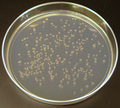earliest axenic cultures were of bacteria or unicellular eukaryotes, but axenic cultures of many multicellular organisms are also possible. Axenic culture...
4 KB (507 words) - 21:51, 23 October 2021
often essential to isolate a pure culture of microorganisms. A pure (or axenic) culture is a population of cells or multicellular organisms growing in...
19 KB (1,983 words) - 20:00, 22 November 2024
Amastigote (redirect from Axenic amastigotes)
An amastigote is a protist cell that does not have visible external flagella or cilia. The term is used mainly to describe an intracellular phase in the...
992 bytes (107 words) - 15:21, 13 December 2020
under the direction of Dr. Peter Faletra, made substantial progress on axenic culture from seed and were able to obtain over 50% germination levels in...
15 KB (1,623 words) - 18:38, 28 May 2024
2009, scientists reported a technique allowing the bacteria to grow in an axenic culture and suggested the technique may be useful for study of other pathogens...
18 KB (1,970 words) - 08:01, 15 December 2024
they can multiply indefinitely. Axenic culture of amoebae was achieved through selection of mutants capable of axenic growth. Under conditions of starvation...
34 KB (3,448 words) - 19:08, 27 October 2024
presentation of some major fungal pathogens. Fungi (ascomycetes) growing in axenic cultures, each of which is a culture of one selected organism and is free...
19 KB (2,003 words) - 12:25, 20 December 2024
Various fungi including Penicillium and Aspergillus species growing in axenic culture...
24 KB (2,388 words) - 15:36, 22 November 2024
Physcomitrella patens plants growing axenically in vitro on agar plates. Petri dish has 9 cm (3.5 in) diameter....
36 KB (4,054 words) - 09:16, 28 October 2024
become used as a model for encystation studies as it will form cysts under axenic growth conditions, which simplifies analysis. After inducing encystation...
14 KB (1,482 words) - 20:12, 16 October 2023









